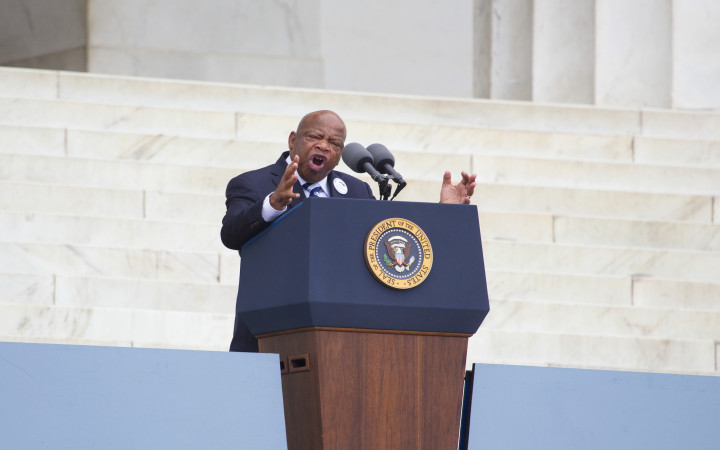Today’s Wonder of the Day was inspired by Anika. Anika Wonders, “who was john lewis” Thanks for WONDERing with us, Anika!
What are you most passionate about? Do you want to protect the environment? How about making sure people have access to clean water? Maybe you care most about treating all people equally. Young people just like you are making a difference in the world every day. And they have been for a long time. Looking for an example? Look no further! Read on to learn about the man at the center of today’s Wonder of the Day—John Lewis.
John Lewis was born on February 21, 1940. He grew up outside of Troy, Alabama. Lewis’s parents worked as sharecroppers, and he helped on the farm from a young age. As a Black American, Lewis also faced racial discrimination from an early age. As a child, he tried to apply for a library card and was turned away. The librarian told Lewis the books there were only for White people.
As a teenager, Lewis was inspired by Dr. Martin Luther King, Jr. after hearing him on the radio. He listened to Dr. King’s words and was moved to action. Lewis became a Freedom Rider to help desegregate public buses in the U.S. He also led sit-ins against segregation in other public places.
While fighting for equality, Lewis also attended college. He went to the American Baptist Theological Seminary in Nashville, where he learned more about methods of protest and helped desegregate the lunch counters. He went on to earn a bachelor’s degree in religion and philosophy at Fisk University. In 1963, Lewis was the youngest person to speak at the first March on Washington. He was only 23 years old.
John Lewis showed courage in the face of hatred and violence. In 1965, he helped lead a march in support of voting rights. The marchers left Selma, Alabama on March 7. They were bound for Birmingham. However, when the marchers crossed the Edmund Pettus Bridge, they were met by a large police force.
The police attacked the 600 marchers and beat them with clubs. They also used tear gas. The officers killed 14 people and injured many more. This event became known as Bloody Sunday. Lewis was severely beaten, suffering a skull fracture and other injuries. Later, he shared that he thought he would die that day.
Did this stop John Lewis? Not at all. He continued to fight for equal rights. His work helped make the Voting Rights Act of 1965 a reality. Later, he led the Voter Education Project (VEP) and helped millions of people register to vote.
Lewis was elected to the United States House of Representatives in 1986. While in office, he continued to work for equality. Many called him “the conscience of the U.S. Congress” because of his dedication to human rights.
As an adult, Lewis also worked to inspire the younger generation. He wrote a series of graphic novels about his time as a civil rights activist. He even won the National Book Award for the third book in this series.
Lewis was also awarded the Presidential Medal of Freedom in 2011 by President Barack Obama. He also received honorary doctorate degrees from Brown University, Harvard University, and the University of Connecticut. In 2019, Lewis shared that he had been diagnosed with pancreatic cancer. He passed away on July 17, 2020.
After John Lewis’s death, the New York Times published a posthumous essay written by the congressman. In it, he told people to “answer the highest calling of your heart and stand up for what you truly believe.” He especially urged young people to action by saying, “You filled me with hope about the next chapter of the great American story.”
What is the highest calling of your heart? How can you put John Lewis’s words into action in your own life? Spend some time today considering the world around you. How will you make it better?
Standards: C3.D2.His.2, C3.D2.Civ.12, C3.D2.Civ.13, C3.D2.Civ.14, CCRA.L.3, CCRA.L.6, CCRA.R.1, CCRA.R.2, CCRA.R.4, CCRA.R.10, CCRA.SL.1, CCRA.SL.2, CCRA.W.2, CCRA.W.4, CCRA.L.1, CCRA.L.2




